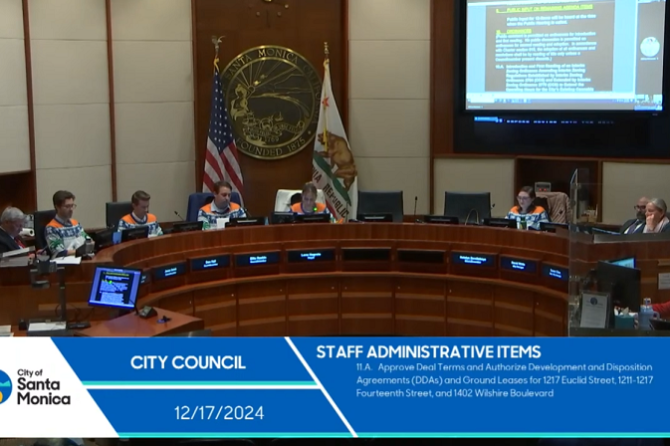If arcane knowledge of computers and web sites and little-known rock bands is in any way the Esperanto of the current and preceding generations, then it’s probably safe to assert that reciting bits from Firesign Theater albums was part of a secret language during a time that seems not that long ago. Alas, it has been years. The death of Peter Bergman reminds us that while time is pliable and will bend with memory, it will never hold still. “The future? I say live it or live with it.”
And there you go: The quoting of small chunks of the collective brilliance of Firesign Theater will likely continue right on to our own deaths. A great deal of their material would make wonderful epitaph lines. I wouldn’t mind if my own gravestone read “How can you be in two places at once when you’re not anywhere at all?” Some future senior citizen is bound to get fresh with a home care nurse while uttering “He’s upstairs, helping Porcelain make the bed.”
Steve Martin joked that “Comedy is not pretty!” but Firesign made a theater of the mind that had an absurd beauty. They also established that spoken word performances could lock onto a counter-cultural mentality hungry to be validated, yet simultaneously ignore taking any of that “consciousness” seriously. Firesign disparaged war, big corporations, government, and… used car lots? The gauche vaudeville of locally-produced TV ads (“Let’s talk about your car. It’s screaming “Wash me please!”) was one of Firesign’s oft-used platforms for goofing on patriotic values (“Shoes for Industry,” “This is a group of Indians leaving Rancho Malario – to make room for YOU”) and visions of the American Dream. But they were without agenda; that they sounded like they agreed with us was plenty.
Like Frank Zappa and the Mothers of Invention, who relentlessly parodied the whole idea of hippies and counter-anything, Firesign was a band of smart guys who took a certain joy in sharing how smart they were. Their output melded the pleasures of well-crafted ‘whack’ Mobius strips of language with the great timing you admired in the improvisational jabs of any truly funny “class clown” from your school days. They were punk with their brains.
I can personally attest to having spent at least 100 hours down in the basement of my parent’s two-story colonial listening to Firesign’s “Don’t Crush That Dwarf, Hand Me the Pliers,” which at some levels was a breakthrough record for them. It seems like that was the record that caused a lot of people to catch up with what they were doing.
Let’s go back to my parent’s basement for a moment. Anyone who ended up pursuing music or comedy as an adult remembers a sustained portion of their youth spent being alone with a record player absorbing the albums of their influences. While that activity often has the appearance of wasted time, those hours can be some of the most crucial in the development of young creative minds.
Firesign’s recordings were a way to get ‘high’ without weed. The group barely referenced drugs in their work, and fans likely experienced vertigo more than pleasure in mixing the two. You just didn’t need the dope. Imagining the kaleidoscopic, accordion-folded worlds that Firesign was conjuring with just their writing, voices, and some sound effects was plenty of ‘buzz’ for anybody open to sitting there and listening.
With all that going on, how was it also really funny? I’m not sure there’s a perfect way to explain that. “Heavy on the 30 weight, Mom!” followed by the wise voice of a father advising “Don’t eat with your hands, son. Use your entrenching tool” suggested that in some alternative universe a high school kid was pouring motor oil on his pancakes, then eating them with his hands while being instructed to use some kind of army surplus device instead. All that flew by in about four seconds, within the context of a jumbled movie from the 1940s.
Peter Bergman lived in Santa Monica for a number of years although the cerebral “Bozo Bus” ride that became Firesign began in Pasadena, at KPFK-FM in 1966 when Bergman was hosting an alternative late-night talk show. With Phillip Proctor, David Ossman, and Phil Austin, the Firesign Theater recorded four albums for Columbia Records between 1968 and 1972. And then people like me started listening to them in their basements. Bergman died of complications of leukemia March 9 at St. John’s Health Center in Santa Monica.
It’s not enough to measure the achievement of Peter Bergman and Firesign in any framework of our having lost a “comedian.” While there was a shared affinity for the bizarre reality found in language, Firesign’s output was vastly more complex and covert than the work of the brilliant George Carlin. At a time when things created to be “entertainment” were discovering the marketing convenience of franchises and sameness of product, Firesign and Bergman were wildly and even toxically original. Once they transmitted their comedic version of what William S. Burrough’s called “the virus of language”… we were theirs. Some have written that the key to Firesign was non-sequiturs, but that’s just too easy and too incomplete. Still, any tribute to Peter Bergman should end the way he might have wrapped it: By jumping from some sweetly twisted trope (“The Department of Redundancy Department”) to… “And now back to our movie.”













